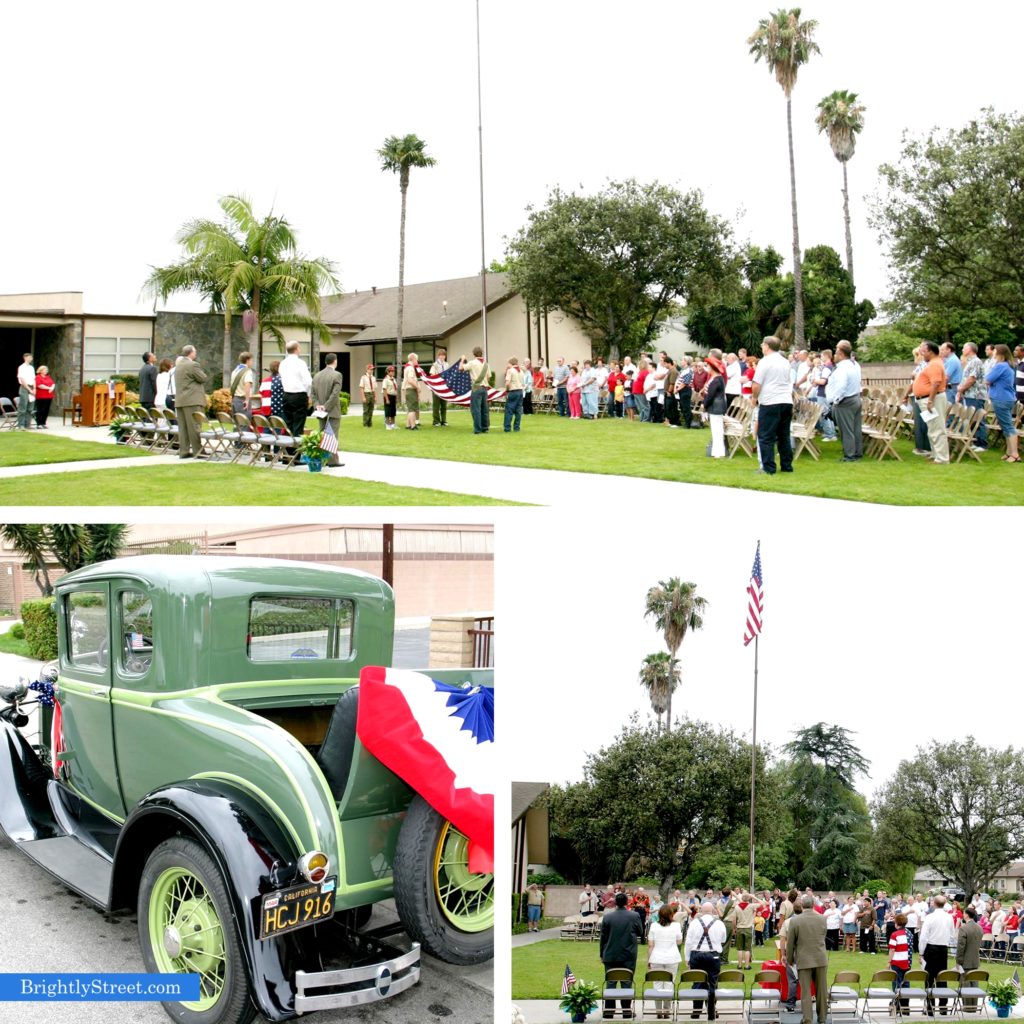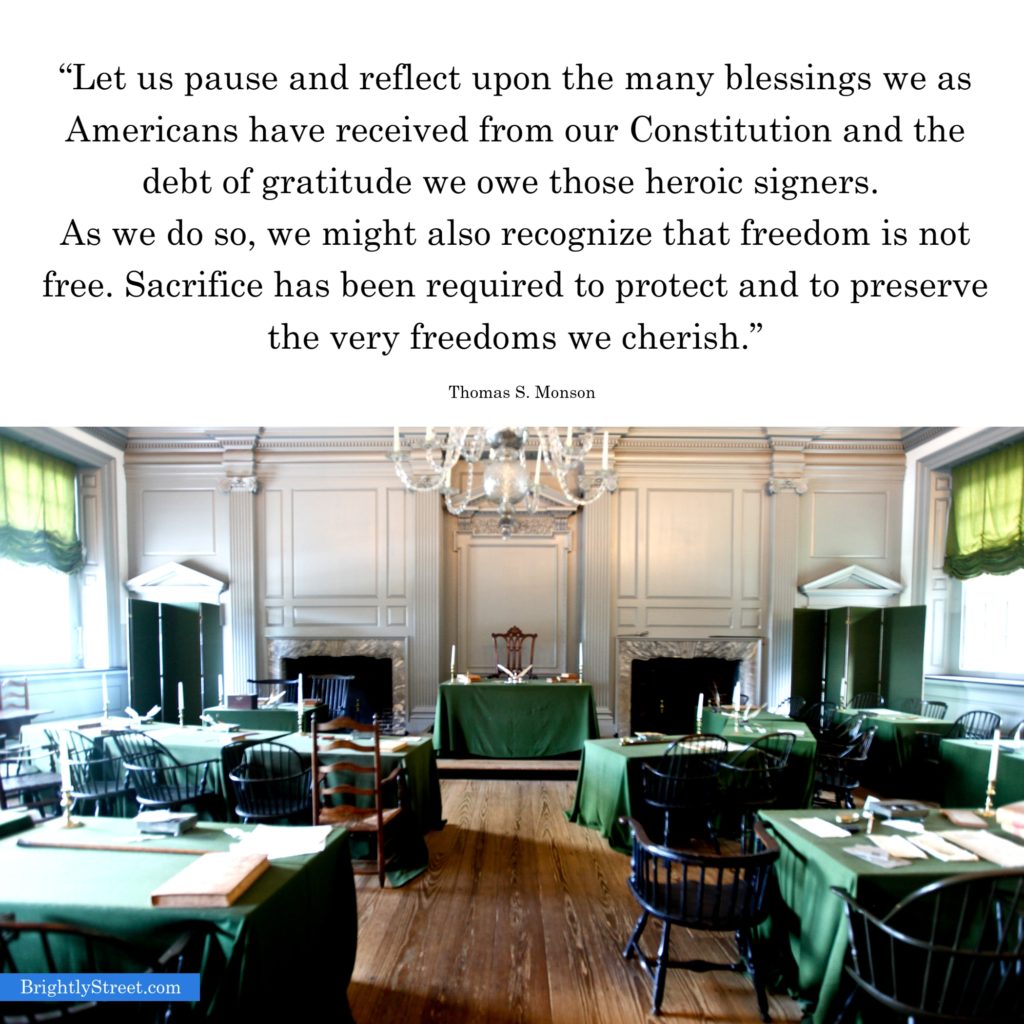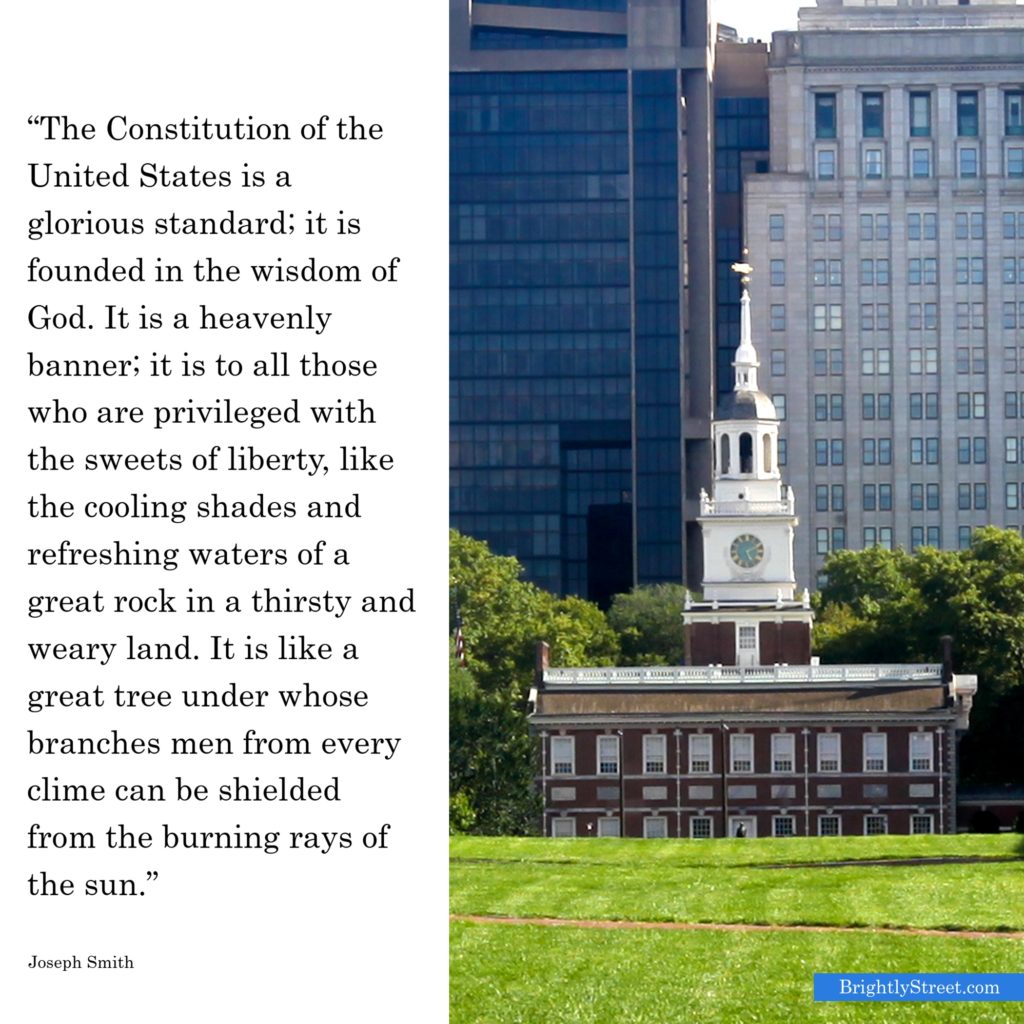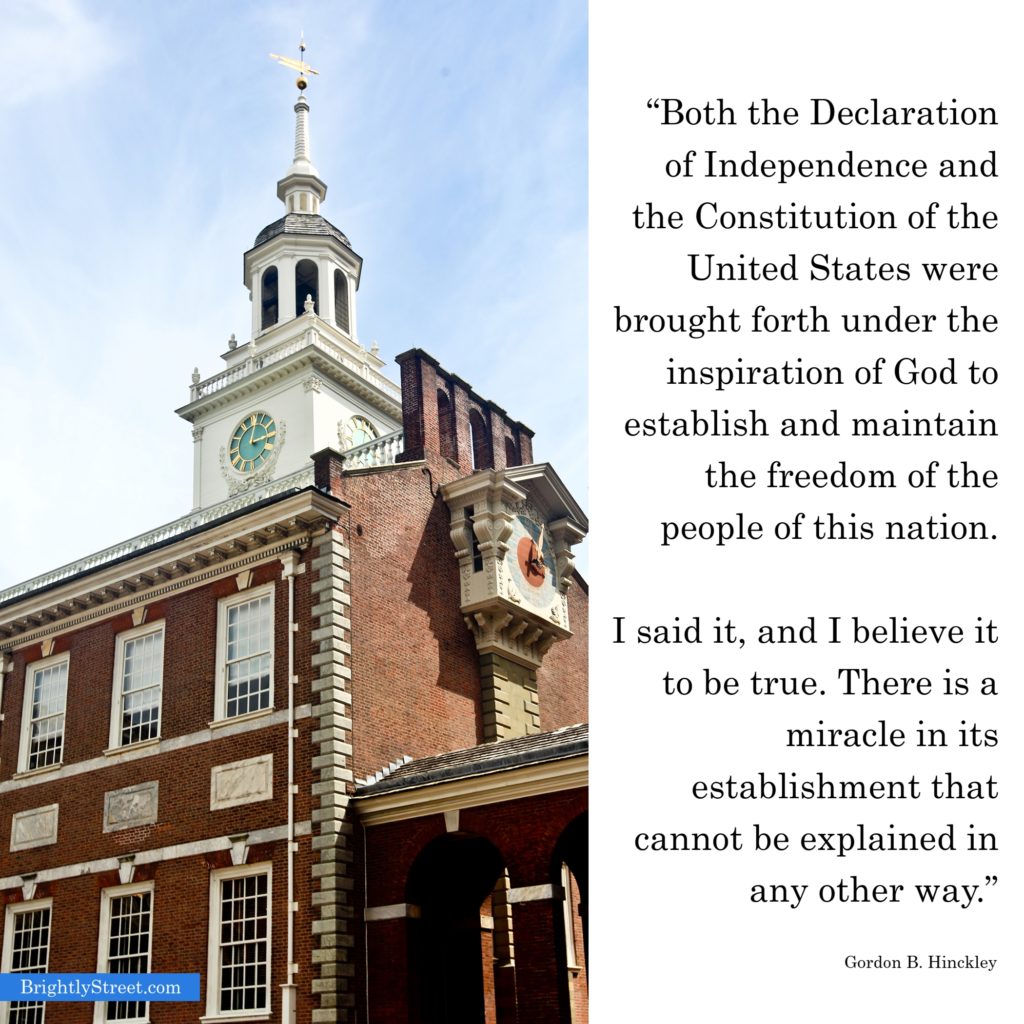Gathering to Remember
Another 4th of July has come and gone, yet how many of us took a moment to remember the reason for this holiday? Growing up in California, we spent every July 4th at the church building for an early morning flag raising ceremony where patriotic songs, inspiring words of freedom by civic leaders and filling tummies with tasty pancakes were a tradition. I remember an older man that would always come in his antique car with the red, white and blue flags attached to it.
Freedom Is Not Free
This year, my boys helped put flags in front of the homes in our neighborhood early in the morning as a reminder of the holiday we celebrate. That flag stands for freedom, liberty and the ability to pursue happiness in a free society, but just as Thomas S. Monson said, “freedom is not free.” With our country divided politically like never before, we face a fork in the road. Do we continue to hold onto prejudices, bullying, hatred and slander or do we look to the past and remember where it all began, a uniting of opinions, hearts and purpose?

Blessings of Freedom
As we gathered with friends on the 4th of July, one young man offered a hurried prayer, I am sure his teenage body was just starving after having swam the afternoon away. I was impressed with his father who understood the purpose and importance of Independence Day. He asked his son to pray again and this time to express gratitude for what was offered to us 100’s of years ago by our founding fathers. Another prayer was spoken by that same son and a thankful plea was given.
As I began my early morning studies, I decided to read, listen and study all I could about why we celebrate Independence Day and what it should and could mean to me today. I found a lack of information shared online that surprised me. I began to dig and uncovered a few treasures that I felt inspired to share with you. Although the 4th of July might of passed, the purpose for it’s celebration should be something we remember often and never take for granted.
I have a unique blessing to be married to an immigrant that lived without the freedoms that we enjoy daily. Of course, there are issues and problems, but all it takes is to cross a border and you will see that what we enjoy in America is not only a blessing, but truly a miracle. I am reminded of the preamble of the United States declaration when I think of the opportunities that my husband did not have while growing up in one of the most dangerous countries outside of a war zone,
“We the People of the United States, in Order to form a more perfect Union, establish Justice, insure domestic Tranquility, provide for the common defence, promote the general Welfare, and secure the Blessings of Liberty to ourselves and our Posterity, do ordain and establish this Constitution for the United States of America.”
Most nations around the world do not experience these great blessings and responsibilities that citizens of the United States of America often take for granted.
Let’s take a look at a few thoughts from various people throughout time. We will first start with Dallin H. Oaks, The Divinely Inspired Constitution, who was once a judge for the Utah Supreme Court. It was his job to know the constitution and to uphold it. He shares some thoughts on the beginning of the United States of America.
He said, “for millennia the world’s people had been ruled by kings or tyrants. Now a group of colonies had won independence from a king and their representatives had the unique opportunity of establishing a constitutional government Abraham Lincoln would later describe as ‘of the people, by the people, and for the people.’
The Constitution
James Madison wrote in the preface to his notes on the Constitutional Convention: “There never was an assembly of men, charged with a great and arduous trust, who were more pure in their motives, or more exclusively or anxiously devoted to the object committed to them.”
The U.S. Constitution was established “by the hands of wise men whom [the Lord] raised up unto this very purpose.” (D&C 101:80.)
Benjamin Franklin stated, “When you assemble a number of men to have the advantage over their joint wisdom, you inevitably assemble with those men, all their prejudices, their passions, their errors of opinion, their local interests, and their selfish views. From such an assembly can a perfect production be expected? It therefore astonishes me, Sir, to find this system approaching so near to perfection as it does. … The opinions I have had of its errors, I sacrifice to the public good.”

Divine Origin of Rights
President Oaks goes on to say, “I have always felt that the United States Constitution’s closest approach to scriptural stature is in the phrasing of our Bill of Rights. Without the free exercise of religion, America could not have served as the host nation for the restoration of the gospel, which began just three decades after the Bill of Rights was ratified. I also see scriptural stature in the concept and wording of the freedoms of speech and press, the right to be secure against unreasonable searches and seizures, the requirements that there must be probable cause for an arrest and that accused persons must have a speedy and public trial by an impartial jury, and the guarantee that a person will not be deprived of life, liberty, or property without due process of law.”
President Ezra Taft Benson said, “Reason, necessity, tradition, and religious conviction all lead me to accept the divine origin of these rights.”

The Declaration of Independence had posited these truths to be “self-evident,” that all men “are endowed by their Creator with certain inalienable Rights,” and that governments are instituted “to secure these Rights.” This inspired Constitution was established to provide a practical guarantee of these God-given rights (see D&C 101:77), and the language implementing that godly objective is scriptural to me.
“That every man may act … according to the moral agency which I have given unto him, that every man may be accountable for his own sins in the day of judgment. “Therefore, it is not right that any man should be in bondage one to another. And for this purpose have I established the Constitution of this land.” (D&C 101:78–80.)
Ezra Taft Benson said, “We [the people] are superior to government and should remain master over it, not the other way around.”
The Book of Mormon says, “An unrighteous king doth pervert the ways of all righteousness… “Therefore, choose you by the voice of this people, judges, that ye may be judged according to the laws… “Now it is not common that the voice of the people desireth anything contrary to that which is right; but it is common for the lesser part of the people to desire that which is not right; therefore this shall ye observe and make it your law—to do your business by the voice of the people.” (Mosiah 29:23–26.)
President Oaks said, “Popular sovereignty necessarily implies popular responsibility. Instead of blaming their troubles on a king or other sovereign, all citizens must share the burdens and responsibilities of governing. As the Book of Mormon teaches, ‘The burden should come upon all the people, that every man might bear his part.’” (Mosiah 29:34.)
Take Action
How can we become responsible citizens and take an active role in preserving our liberty?
Dallin H. Oaks continues, “As the Lord declared in modern revelation, constitutional laws are justifiable before him, “and the law also maketh you free.” (D&C 98:5–8.) The self-control by which citizens subject themselves to law strengthens the freedom of all citizens and honors the divinely inspired Constitution… The twelfth Article of Faith declares: “We believe in being subject to kings, presidents, rulers, and magistrates, in obeying, honoring, and sustaining the law.”
“We believe that governments were instituted of God for the benefit of man; and that he holds men accountable for their acts in relation to them… “We believe that all men are bound to sustain and uphold the respective governments in which they reside.” (D&C 134:1, 5.)
John Adams said, “Our Constitution was made only for a moral and religious people. It is wholly inadequate to the government of any other.”
In closing, President Oaks said, “It is part of our civic duty to be moral in our conduct toward all people. There is no place in responsible citizenship for dishonesty or deceit or for willful law breaking of any kind. We believe with the author of Proverbs that “righteousness exalteth a nation: but sin is a reproach to any people.” (Prov. 14:34.) The personal righteousness of citizens will strengthen a nation more than the force of its arms.
The single word that best describes a fulfillment of the duties of civic virtue is patriotism. Citizens should be patriotic…What do we mean by patriotism in the context of our times? … A patriotism that puts country ahead of self; a patriotism which is not short, frenzied outbursts of emotion, but the tranquil and steady dedication of a lifetime…
My favorite prescription for patriotism is that of Adlai Stevenson: ‘Our fathers’ God, to thee, Author of liberty, To thee we sing; Long may our land be bright With freedom’s holy light. Protect us by thy might, Great God, our King!'”
Will we accept the call to stand for freedom and liberty? If not, who will…


